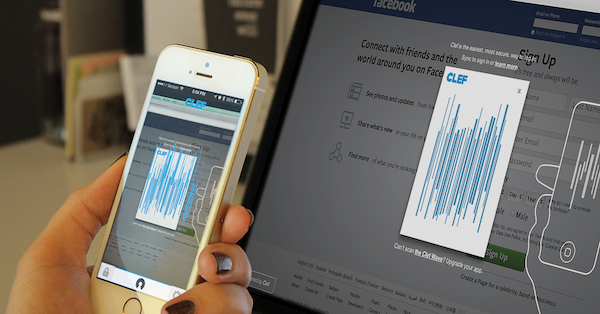Bitcoiners are a particular breed of human. They like their private keys kept in a safe place, and they are more than likely to enable privacy settings on their Facebook account. They’re not a paranoid bunch, but they do value security and privacy above ease of use.
The basis for their unwavering belief in security and privacy is the fact that Bitcoin itself is founded upon the principles of secure, private and trustless use. When paying with bitcoin, there is no other party in the transaction besides oneself and the retailer. The transaction is a closed loop protected from spying eyes. This expectation for closed-loop interactions is carried forward with Bitcoiners and how they use the Internet.
Security tools are one of the biggest topics in the Bitcoin world today. There are discussions online everyday about how to secure bitcoins, and what cold storage wallet is the best option. Strangely though, there is not a lot of discussion about access control.
Crypto Two-Factor
Clef, an Oakland, California-based two-factor authentication company, has been making strides lately with its key-based solution that uses the same public-key cryptography as bitcoin wallets. Essentially, Clef works by sending an encrypted key from the user’s phone using the RSA algorithm, which then allows websites to recognize users from their device rather than from a password. Yes, you read that correctly. In fact, Clef seems determined to eliminate the need for passwords altogether.
As a result of Clef’s security-first focus, several Bitcoin-related websites have begun integrating it as a solution to better secure user accounts. Recently, Bitspark, an exchange that is also the first company in the world to offer end-to-end bitcoin remittances, boarded the crypto two-factor rocketship. Bitspark CEO, George Harrap, is quoted as saying,
“From the first time I saw someone log in with Clef, I knew that this was the future of logging in. Our whole team got excited about the technology and the integration was really quick.”
Admittedly, logging in with Clef does feel a bit futuristic. The company uses what they call the “Clef Wave” to allow account access. In practice, users sync a wave pattern between their smartphone and computer screen to log in, something that has to be experienced firsthand.

Bitcoin Companies Jump On the Wave
Bitspark is not the only Bitcoin company offering wave logins. Cryptofunding platform Koinify has also integrated Clef’s crypto two-factor authentication. As mentioned on Koinify’s blog:
“Koinify's wallet uses Clef's 2FA solution, which we believe provides the sleekest, most intuitive, and secure authentication experience for all ... With the addition of Clef, we hope to bring a stronger peace of mind to our users regarding the security of their tokens and account.”
Jeremy Johnson, the developer of CoinDaddy, also had choice words to say about Clef. CoinDaddy, the crypto 2.0 services company making blockchain technologies easier to understand, also recently integrated Clef’s two-factor. “If any cryptocurrency company is looking for good/cheap/secure 2FA authentication, I would highly suggest Clef,” Johnson stated.
The latest integration comes from e-commerce company Ziftr. Ziftr has integrated Clef’s solution into its cryptocurrency and credit card payment platform, ziftrPAY, to provide enhanced security for its users. Bob Wilkins, CEO of Ziftr, commented:
“With ziftrPAY, we’re creating a simple, secure shopping experience for merchants and shoppers, so it makes perfect sense for us to incorporate two-factor authentication from a company that also values simplicity and security.”
It’s great to see companies make security a top priority. The secure, distributed cryptography used by Clef is another clear example of how Bitcoin is improving security and privacy across the entire Internet.
Did you enjoy this article? You may also be interested in reading these ones:
